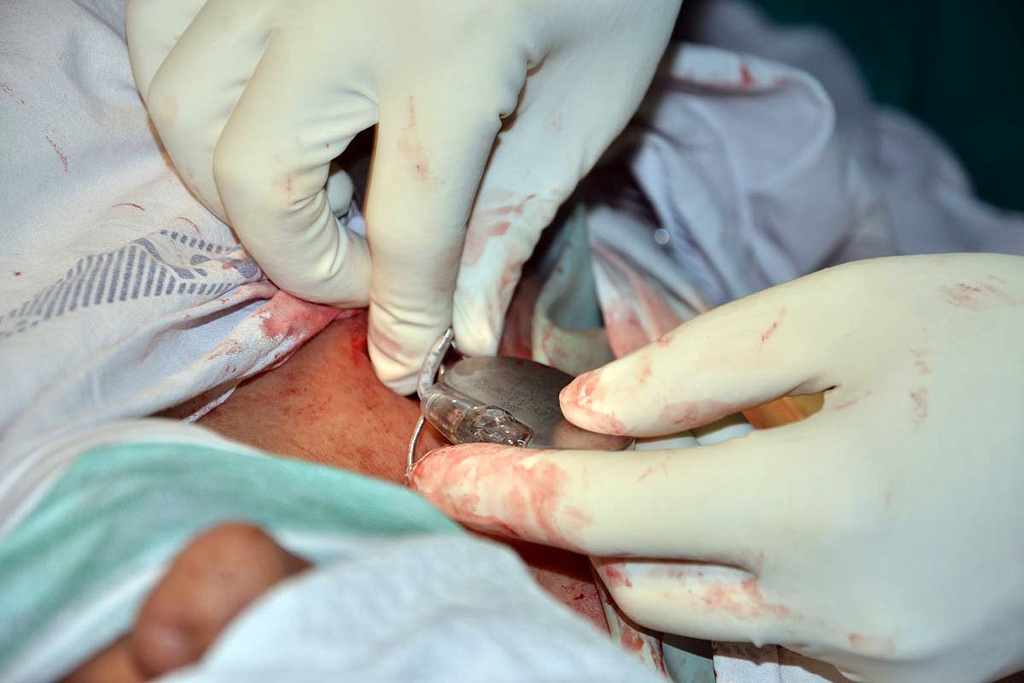Pacemakers have saved a lot of lives over the years by helping to regulate the heartbeats of those with arrhythmia. The problem, however, is that those pacemakers run on batteries that have a tendency to run out of juice after a while. As a result, patients have to undergo an invasive procedure every once in a while in order to stay alive. By utilizing the technology that allows wristwatches to function, this problem may have finally been addressed.
The researchers responsible for the discovery are Andreas Haeberlin and Adrian Zurbuchen from the University of Bern and the University of Michigan, Futurism reports. The method that the pair proposed basically involves initiating a cycle between the pacemaker and the heart, where the heartbeat will give the pacemaker power via kinetic energy and the pacemaker will give the heart assistance in order to maintain a consistent rhythm.
By setting the system up like this, it creates a loop where the pacemaker is continuously powered and the heartbeat is continuously maintained to have a normal pace. Basically, the researchers just made the heart the battery for the thing that’s keeping it working. A symbiotic relationship, in a sense.
Aside from pacemakers, this discovery could potentially also have an impact on other implanted devices, TechXplore reports. These could include defibrillators or electrical stimulators that keep important organs from ceasing to function. This is a solution that addresses one of the biggest problems involved in implanted devices.
"Repeated battery replacement procedures can be avoided by extending the implants lifespan, which is the goal of energy harvesting concepts,” the Abstract of the paper reads. This reduces the risk of complications for the patient and may even reduce device size. The continuous and powerful contractions of a human heart ideally qualify as a battery substitute."



 SpaceX Pushes for Early Stock Index Inclusion Ahead of Potential Record-Breaking IPO
SpaceX Pushes for Early Stock Index Inclusion Ahead of Potential Record-Breaking IPO  Tencent Shares Slide After WeChat Restricts YuanBao AI Promotional Links
Tencent Shares Slide After WeChat Restricts YuanBao AI Promotional Links  Anthropic Eyes $350 Billion Valuation as AI Funding and Share Sale Accelerate
Anthropic Eyes $350 Billion Valuation as AI Funding and Share Sale Accelerate  Royalty Pharma Stock Rises After Acquiring Full Evrysdi Royalty Rights from PTC Therapeutics
Royalty Pharma Stock Rises After Acquiring Full Evrysdi Royalty Rights from PTC Therapeutics  Nvidia Nears $20 Billion OpenAI Investment as AI Funding Race Intensifies
Nvidia Nears $20 Billion OpenAI Investment as AI Funding Race Intensifies  GLP-1 Weight Loss Pills Set to Reshape Food and Fast-Food Industry in 2025
GLP-1 Weight Loss Pills Set to Reshape Food and Fast-Food Industry in 2025  Novo Nordisk and Eli Lilly Cut Obesity Drug Prices in China as Competition Intensifies
Novo Nordisk and Eli Lilly Cut Obesity Drug Prices in China as Competition Intensifies  OpenAI Expands Enterprise AI Strategy With Major Hiring Push Ahead of New Business Offering
OpenAI Expands Enterprise AI Strategy With Major Hiring Push Ahead of New Business Offering  Jensen Huang Urges Taiwan Suppliers to Boost AI Chip Production Amid Surging Demand
Jensen Huang Urges Taiwan Suppliers to Boost AI Chip Production Amid Surging Demand  SoftBank Shares Slide After Arm Earnings Miss Fuels Tech Stock Sell-Off
SoftBank Shares Slide After Arm Earnings Miss Fuels Tech Stock Sell-Off  Eli Lilly and Novo Nordisk Battle for India’s Fast-Growing Obesity Drug Market
Eli Lilly and Novo Nordisk Battle for India’s Fast-Growing Obesity Drug Market  Palantir Stock Jumps After Strong Q4 Earnings Beat and Upbeat 2026 Revenue Forecast
Palantir Stock Jumps After Strong Q4 Earnings Beat and Upbeat 2026 Revenue Forecast  Sanofi’s Efdoralprin Alfa Gains EMA Orphan Status for Rare Lung Disease
Sanofi’s Efdoralprin Alfa Gains EMA Orphan Status for Rare Lung Disease  AstraZeneca’s LATIFY Phase III Trial of Ceralasertib Misses Primary Endpoint in Lung Cancer Study
AstraZeneca’s LATIFY Phase III Trial of Ceralasertib Misses Primary Endpoint in Lung Cancer Study  Novo Nordisk Warns of Profit Decline as Wegovy Faces U.S. Price Pressure and Rising Competition
Novo Nordisk Warns of Profit Decline as Wegovy Faces U.S. Price Pressure and Rising Competition  Nvidia Confirms Major OpenAI Investment Amid AI Funding Race
Nvidia Confirms Major OpenAI Investment Amid AI Funding Race  SoftBank and Intel Partner to Develop Next-Generation Memory Chips for AI Data Centers
SoftBank and Intel Partner to Develop Next-Generation Memory Chips for AI Data Centers 































